- Home
- Jerold Last
The Surreal Killer (Roger and Suzanne South American Mystery Series Book 2) Page 5
The Surreal Killer (Roger and Suzanne South American Mystery Series Book 2) Read online
Page 5
Now it was Vincent's turn to ask, "What do you want from me?"
"For now, access to your colleagues at the meeting and any ideas you have, especially if anybody seems to be acting kinky. After the meeting, I'd like an invitation for Suzanne to come visit your campus in Iquique to talk to your colleagues so we can check out the players a bit," I answered.
"OK."
"I'll arrange with Eduardo to meet you and give you a look at the files on the case. Maybe you'll see something we've missed from the crime site photos. Do you have any plans for dinner?"
"No. Do you have something in mind?"
"Yes. I'll call Eduardo and see if he's free to meet you and bring his files."
Eduardo was free, and the three of us had dinner at a nice fish and seafood restaurant overlooking the ocean. Vincent and Eduardo seemed to hit it off immediately, perhaps due to their background as spies that they had in common, perhaps as an example of professional courtesy when two sharks meet. Vincent looked at the files, stared at the crime scene photos, then sat back and addressed Eduardo.
"The M.O. of injecting a paralytic drug directly into the jugular vein before killing someone is standard 1970s CIA, just like we taught our Chilean trainees. You guys may be on the right track here. I'd like to help."
Eduardo turned to me. "Good recruitment, Roger. We can use all of the help we can get on this case. I think you may have accomplished all that I asked you to do, and done it in record time. Do you and Suzanne want to go home now or stay with this case a while longer?"
"I think we want to visit the Atacama Desert, Iquique, and Arica, as well as play tourist in San Pedro de Atacama before we go home. I'll check with Suzanne to make sure, but it's a good bet that she'll want to see the Northern Chile that tourists visit during this trip."
We chatted about a lot of stuff over the rest of dinner, including the logistics for our invitations to Iquique.
By the time we got back to the hotel Suzanne had returned and we all had a drink in the hotel bar while we filled Suzanne in on our dinner discussions. She was enthusiastic about visiting Northern Chile and had nothing to report about any possible suspects from the native Spanish speaker side.
As we crawled into bed, I asked Suzanne "Do you know why it's pretty much impossible to starve to death in the Atacama Desert?"
"No, Roger," she answered, "Why is it impossible to starve to death in the Atacama Desert?"
"It's impossible to starve to death in the Atacama Desert because of all the sand-which-is there."
Chapter 7. Get With the Program
I remembered how it was when I first applied for the program. Only the best of the best here in the Atacama Desert region were eligible to enroll. Before they would admit anyone into the training program we had to pass some Mickey Mouse psychological fitness tests. I'd had several psych classes in college, so had a very good idea of what they did and didn't want to hear or see on the Rorschach test, the MMPI test, and in "casual" conversation about our childhood experiences. I scored very well on the standardized tests. No surprise there; I had taken them all several times in college and interpreted the results with the aid of answer keys we were provided.
The program psychiatrists also asked me open-ended questions about what it was like growing up for me. "Did you have a happy childhood? What sorts of things did you do with your father? What was your mother like? How did your parents get along? Did they ever fight?"
I painted the picture of an almost idyllic childhood where Dad took me out hunting and played sports with me after teaching me the fundamentals. In this version of growing up, we had German Shorthaired Pointers we raised for pets and for hunting upland game. Dad let me help train the puppies with pheasant wings at the end of fishing poles to teach them to point when I was very young and how to teach the dogs more complex tasks as I grew older. He bought me my first deer rifle when I was 12 and my first shotgun a year later, and taught me to shoot both of them. For the shrinks I remembered crisp autumn days hunting in the field with a patient father who taught me all he knew about deer and pheasants until I was ready to go out on my own. The dogs were always trained gently with positive rewards when they succeeded and positive encouragement at all times, as was I. The dogs and I grew up perfectly well adjusted, high achieving, and everybody's buddy.
I also took pains not to forget Mom in the narrative. She was the perfect homemaker, cooking gourmet dinners with simple healthy foods and helping me with my school homework when I found a concept difficult. She was the essential centerpiece of the happy family, raising me and supporting her husband with limitless unconditional love and respect. I never saw my mother angry. This version of Mom was a shoo-in for a Mother of the Year award, and was similar in many respects to Mother Theresa, but a lot nicer person.
It was a good thing the shrinks couldn't look in on my dreams, which better captured the reality of how I grew up. At least three times a week for as long as I could remember I had one or the other of two dreams about my parents. Both dreams were always the same. I could never see their faces clearly in the dream, but their actions were a familiar ritual. In the first dream, my father was the star.
“Let’s go hunting, hijo,” my father invited me. In the dream I looked to be about 10 years old.
“No es possible,” said my mother, “today is a school day and he must go to la escuela.”
My father walked over to where she stood and calmly hit her several times until she fell to the floor sobbing. “I make the decisions here,” he told her. “Do not ever try to countermand my instructions again.”
In the second dream, which I had much more often, my mother had the starring role. In the dream I knew that something like this occurred almost every day.
“Bring me my medicine, querido,” ordered my mother.
I brought her the ever-present bottle of Pisco.
She drank deeply, then pulled out her belt and beat me with it. As she hit me with the belt she said over and over, “Next time I ask you for my medicine I want it faster. Don’t stand there dreaming. Bring it immediately!”
In this dream I could hear the little boy’s thoughts. “Just wait till I’m older and stronger. Then you won’t be able to beat me like this! No mas! No mas!”
Chapter 8 . Lima and Cuzco, Tuesday
On the second, and last, day of the meeting I circulated around in the English speaking sessions just trying to meet and talk to as many people as I could. I got a lot of first impressions, but not much in depth. By and large everyone was friendly and knew me as the spouse of a North American biochemist attending the meeting.
The most frequently asked question was "How much of this stuff do you understand?"
The answer was invariably, "Most of it. I majored in chemistry in college."
The meeting ended in mid-afternoon. Suzanne and I walked over to The Inca Market, which was huge, occupying a couple of square blocks, to look for some inexpensive gifts for my friends and family. Much of what was for sale in El Mercado de Las Incas was cheap junk, but some of the smaller shops carried handmade alpaca scarves and sweaters and silver jewelry. Suzanne had been here yesterday so led me directly to the proper stalls in the immense market complex to buy what I needed for gifts. Some of these items were relatively inexpensive and of very high quality compared to what was available at home. We spent a couple of hundred dollars and I had gifts for everyone, including a few additional caps and sweaters that I liked, also made of ultra-soft alpaca, for the expected new baby. I went with Suzanne's instincts on these choices, and bought blue.
The day passed quickly. Suzanne and I got back to the hotel in time to connect with Vincent and Eduardo, who Suzanne had invited to join us for dinner. After all, for the purpose of this trip they were second cousins in case anyone was paying attention. We exchanged abrazos (the unisex universal embrace exchanged among Spanish speaking cultures) all around and grabbed a cab.
Most of our discussion at dinner centered upon planning the rest of our trip. The fina
l decision was that we were expected in Iquique in three days, just in time for a large party that Vincent would arrange in honor of Suzanne's visit. Invited guests would be the English speakers from the University of Chile faculty, assorted administrators from the campuses at Iquique and Arica, and as many of the CIA agent cohort trained by him that Vincent could locate in the area. Eduardo, who would be introduced as a second cousin of Suzanne's from Asuncion, Paraguay who was spending some time with us in Peru and Chile while he had a chance, would also be invited to the party.
Suzanne and I would spend a couple of days as tourists in Cuzco and Machu Picchu before flying directly to Iquique. We'd probably reroute our return home from Santiago, but we'd leave that open for now. Eduardo would catch up on work in Paraguay and meet us back in Iquique for the parties.
"Why are you getting yourself involved in all of this?" Eduardo asked Vincent curiously. "What's in it for you to spend a ton of your own money on parties and to risk losing some of your friends?"
"It's a lot of things," Vincent answered. "Yesterday I told Roger about the difference between sharks and guppies. Eduardo, you're definitely another shark. I'm starting to feel like I've become part guppy and don't like that feeling at all. You're offering me a chance to be part of the sharks again, and that's where I want to be. Add to that from what Roger tells me, I might have had a hand in creating this monster. My dad taught me that when I make a mess it's my responsibility to help clean it up. That's still pretty good advice forty years later. And maybe I'm just not as proud now as I was then of what we did here 30-odd years ago. Perhaps I owe something to all of the innocent people who suffered because of the stuff I did for the CIA during the military dictatorship here in Chile. Anyway, as they say in poker, I'm all in."
Spontaneously, I reached over and shook Vincent's hand. Suzanne gave him an awkward hug, and even Eduardo seemed to be touched as he patted his shoulder.
"Welcome aboard, D'Artagnan," said Suzanne with a smile.
Eduardo asked Vincent, "We have to start somewhere. Is there anyone or any group of individuals you'd start looking at in detail over the next couple of days if you were me?"
"That's an interesting question and I've been thinking about the answer all day. Let me tell you how I'd do it, but you've done a lot more of this sort of thing than I have and I'm not going to try to do anything except throw a few thoughts out there and hope to help. I've already told Roger I'd give the old CIA guys a pass since we all went through a lot of psychological evaluation before they sent us out here. I'll give you their names so you know who they are. I know most of the faculty at Iquique and both of the guys in my field from Arica. I'll give you the list of faculty who I know were around in the Pinochet days and who I know we trained too. But I wouldn't rule out the administrators yet. I think the guy or guys we're looking for would have found their way to positions of power, at least in the bureaucratic sense. I don't know a lot of these guys, but I'll flag anyone I know on the list who we trained.
"There are two more things I can do, but I want to ask your advice before I jump in. First, I can talk to my old CIA buddies and get much more complete lists of trainees. But, and it's a big but, I don't have any need to know this, so they'll get suspicious of why I'm asking and we may let the cat out of the bag."
Eduardo thought for a few seconds and replied, "I agree. If we just keep things among the four of us for now, we're less likely to put the killer on alert that we're after him."
"The second thing I can do," Vincent said pensively "Is give you an answer to one of the questions Roger asked me. He asked about subgroups within the larger society of biochemists that might be organized around other themes or interests. You'll get two of these from the lists I'll give you, CIA guys and local trainees who did interrogations and intelligence work for the dictatorship. That second list won't be complete, especially for the administrators."
"That would be very helpful," replied Eduardo, "And should keep my computer guys busy for a while. I suspect there will be a lot of records in that group that begin only about 20 years ago, with no entries during the Pinochet dictatorship years. Can you try to cross-reference as many of the names as you can to who among them are currently friends or close colleagues of each other?"
"I'll try to do the matching you're asking for, especially for the names from Iquique. But you need to know there's a third group that overlaps the second one, and I'd guess that's where your guy is most likely to be," said Vincent. "Chile is a slightly schizophrenic country. Unlike Uruguay, we've never really come to grips with our past. The old Pinochet crowd and their sycophants still occupy positions of power in all walks of society. They were never booted out even when we elected left-wing presidents and senators. The political right and left coexist in a sort of uneasy truce. I suspect that your killer, if he's Chilean, could be one of those dinosaurs left over from the past. I'm not an FBI profiler but I think I can give you a pretty good picture of who you're looking for just based on Chilean history. I predict your killer or killers will be a man in his mid-50s to mid-60s, a staunch Roman Catholic who may well be a member of Opus Dei since most of the Pinochet crowd were very conservative Catholics, and a mid- or upper-level bureaucrat at one of the universities or in some sort of government job where he's been for 25-30 years. I'd start by getting my hands on whatever records exist for anyone you can identify who fits the profile I just gave you. And, just in case, I'd do the same thing for Peru and Bolivia."
Vincent stood up and spoke directly to Eduardo. "Eduardo, let's you and me go back to a nice bar far enough away from the hotel so we're not seen together and I'll start making lists for you. Give me an e-mail address so I can update the lists if I remember anyone else when I get home and can go over my old records. Roger, why don't you and Suzanne go back to the hotel now and start planning where to go and what to see during your mini-vacation? Let me give you my contact information in Iquique so we can get together there at least a day before the big party and plan some more strategy. I'm married and have a couple of kids living in a small house, so you'll have to stay at a hotel. Iquique is a resort city, so things are surprisingly expensive. I'll make arrangements for you and Eduardo to stay at the same place at the University discount, so there shouldn't be any hassles for you when you get there. Just call me when you arrive in Chile and I'll tell you where to go."
Eduardo's cell phone rang. He talked for a minute, ended the call, and turned to us with a serious look on his face. "There's been another Surreal Killer murder, this time here in Lima near the airport. Do you guys want to see the crime scene before we call it a night?"
"I think I'll pass on this one," answered Suzanne. "I've done my fair share of throwing up during my first trimester and you don't need me messing up your surreal scene. Can you swing past the hotel and drop me off on your way there, please?"
After delivering Suzanne to the hotel, we drove out to Callao, the district near the international airport. The body was in the harbor zone, in a brightly lit area surrounded by a crowd of police and technicians. The combination of streetlights and floodlights gave the entire area a strange yellow-orange color. Any civilian onlookers had long since been sent home and the area was sealed off. The entire scene was invisible from the street we had driven in on, so was about as deserted as you can find in a major urban area like Lima, a large metropolitan area of more than nine million residents. Eduardo waved his credentials and we were passed through the security cordon. The body, or what was left of it, lay in a deserted commercial warehouse area, in the middle of what was probably a parking lot during the day. The crime scene was surrounded by a huge amount of miscellaneous trash discarded by the harbor workers during the preceding day. Some poor cops from Lima would have to sort through all of that trash by hand looking for evidence even if everybody knew there weren't going to be any clues. It looked a lot like the previous crime scene photos, with the badly burned victim mercilessly hacked to death and copious quantities of blood splattered everywhere. This was to
tal overkill, well beyond what had been required to kill her. The remains of a machete that had obviously been in the hottest part of the fire lay on top of the body.
I looked around the entire surreal crime scene rather than directly at the victim without seeing any clues: Nothing, nada, zilch. Except for the message written beside the body, which said "no mas" written in blood. Presumably the blood originated from the victim and was obtained via the machete. I looked at the burned body and the charred plastic and metal on top of the body. Victim number 10 looked a lot like victims numbered 1-9. The only difference was that I wasn't just looking at an obscene photo but I was seeing reality. I heard Vincent mumble something that included the words "sick son of a bitch," and realized he was just as angry as I felt.
"I could use a stiff drink right now," said Vincent. "How about you?"
"That would work for me," I replied.

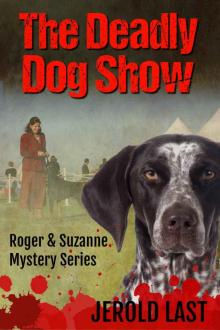 The Deadly Dog Show (Roger and Suzanne South American Mystery Series Book 6)
The Deadly Dog Show (Roger and Suzanne South American Mystery Series Book 6)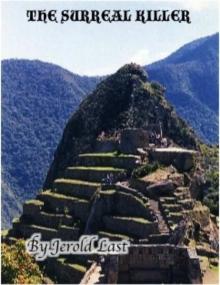 The Surreal Killer (Roger and Suzanne South American Mystery Series Book 2)
The Surreal Killer (Roger and Suzanne South American Mystery Series Book 2)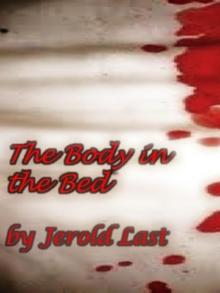 The Body in the Bed (Roger and Suzanne South American Mystery Series Book 5)
The Body in the Bed (Roger and Suzanne South American Mystery Series Book 5)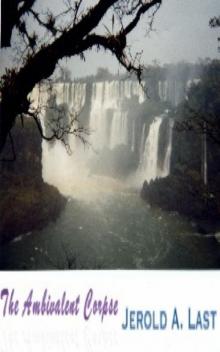 The Ambivalent Corpse (Roger and Suzanne South American Mystery Series Book 1)
The Ambivalent Corpse (Roger and Suzanne South American Mystery Series Book 1)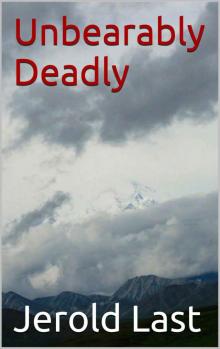 Unbearably Deadly (Roger and Suzanne South American Mystery Series Book 9)
Unbearably Deadly (Roger and Suzanne South American Mystery Series Book 9)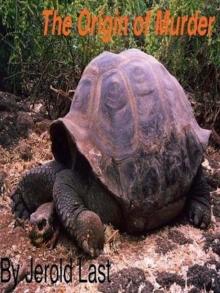 The Origin Of Murder (Roger and Suzanne South American Mystery Series Book 8)
The Origin Of Murder (Roger and Suzanne South American Mystery Series Book 8)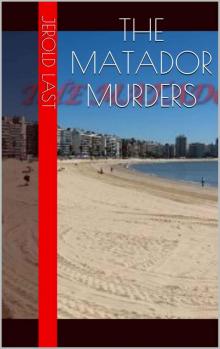 The Matador Murders (Roger and Suzanne South American Mystery Series Book 4)
The Matador Murders (Roger and Suzanne South American Mystery Series Book 4)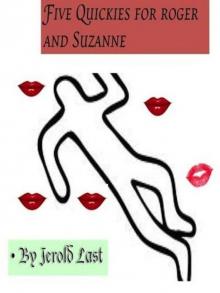 Five Quickies For Roger And Suzanne (Roger and Suzanne South American Mystery Series Book 7)
Five Quickies For Roger And Suzanne (Roger and Suzanne South American Mystery Series Book 7)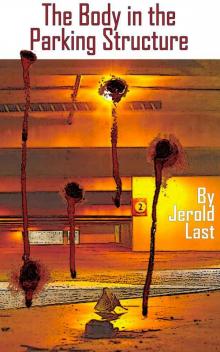 The Body in the Parking Structure (Roger and Suzanne South American Mystery Series Book 4)
The Body in the Parking Structure (Roger and Suzanne South American Mystery Series Book 4)